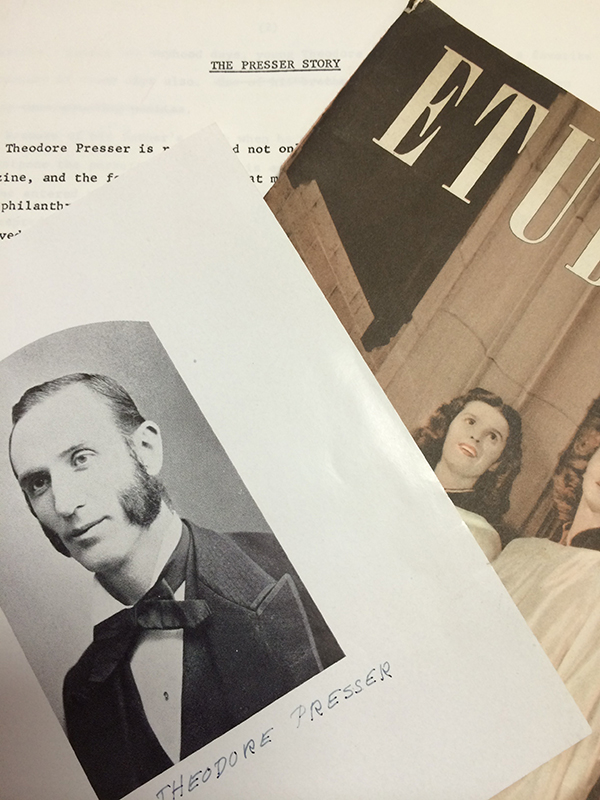 When Theodore Presser was a teacher at Hollins College in Virginia he was so poor he had just a single suit. So, when those clothes needed mending, Presser took to his bed while his seamstress made repairs.
When Theodore Presser was a teacher at Hollins College in Virginia he was so poor he had just a single suit. So, when those clothes needed mending, Presser took to his bed while his seamstress made repairs.
It is stories such as this, in the early life of Presser, that drives intensive research being undertaken by Dr. E. Douglas Bomberger, Elizabethtown College professor of music and a leading expert on 19th-century American music.
Bomberger was chosen from a pool of 13 proposals by the The Presser Foundation to write a full-length research article on the life and work of benefactor Presser as they commemorate the 75th anniversary of The Foundation’s founding. Though much was known about Presser’s adult life, little had been researched on the influences that brought him to publishing … and, therefore, his fortune.
(The Foundation is) interested in the part of his life 35 years before publishing took him from rags to riches.”
Though his beginnings were meager, at Presser’s death in 1925—with no children and two spouses who had preceded him—he was a philanthropist and founder of the Presser Foundation, Etude magazine, the Music Teachers National Association and Philadelphia’s Home for Retired Music Teachers. The enormous fortune he had amassed in the printing business now funds scholarships, various other music-related endeavors and a foundation that carries his name.
 As part of the grant, Bomberger was given full access to The Foundation’s collection of Presser’s personal papers, photographs and documents as well as $35,000 to carry out additional research. In the end, the hope is to have the article published in an academic or professional journal.
As part of the grant, Bomberger was given full access to The Foundation’s collection of Presser’s personal papers, photographs and documents as well as $35,000 to carry out additional research. In the end, the hope is to have the article published in an academic or professional journal.
Presser, Bomberger said, “is someone who was tangential to my research all along.” He touched on Presser briefly even during his doctoral research and in 2004 his book, An Index to Music Published in The Etude Magazine, 1883-1957, was published.
Bomberger has been traveling around to the places Presser attended school and where he taught—Ohio, Virginia—and unearthing new and interesting information. “His career as a publisher is well known,” Bomberger said. “(The Foundation is) interested in the part of his life 35 years before publishing took him from rags to riches”
The goal of the paper “is to produce a document that will provide a better understanding of Mr. Presser’s background and influences, as well as his accomplishment, in relation to the events and ideas of his time and place,” noted a Foundation media release.
Presser, born in 1848, created and published Etude magazine and, with $250 to start, was founder of a printing firm. As a teen he worked in an iron foundry, sold tickets for an opera company in Pittsburgh and was a music clerk in a retail store. He so impressed the owners that, still in his teens, he became manager of the sheet music department, which prompted his interest in publishing music.
Because his father died when Presser was only 10, the young man was forced to postpone his pursuit of education until 1868 when he entered Mount Union College in Ohio. At age 20 he began as a music instructor at Mount Union and, then, at Ohio Northern University and Miami Conservatory of Music in Xenia, Ohio.
He continued his studies at New England Conservatory while also instructing in sight-singing. Eventually he founded the Department of Music at Ohio Wesleyan University.
On a $1,000 a year salary he saved enough to travel to Germany, where he attended the Leipzig Conservatory.
When he returned to the United States two years later, he became director of music at Hollins College. It was at this time that he began publication of Etude, a 10-page paper dedicated to music, which, according to Bomberger, is the most popular magazine in the music teaching community. There were 2,000 copies printed for the first edition; by 1918 that number swelled to 217,805. Etude was Presser’s entry in to the world of publishing, Bomberger said.
In 1906, he established the “Home for Retired Music Teachers” in Philadelphia, and in 1939, the Presser Foundation, dedicated solely to music education and music philanthropy, was established as part of Presser’s will.
Though Etude publishing ended in 1957, the publishing business that grew from that continues today, Bomberger noted.
Bomberger said he heard about the call for papers through his connection to The Presser Foundation, which gives a significant scholarship each year to an outstanding music major at Elizabethtown College. The article is due at the end of May 2015.
“My job as a music historian is to identify interesting topics, do the research and report on it,” Bomberger said. “I would have been interested in 19th-century American music anyway, but this is a way to get the good name of the College out there.”

